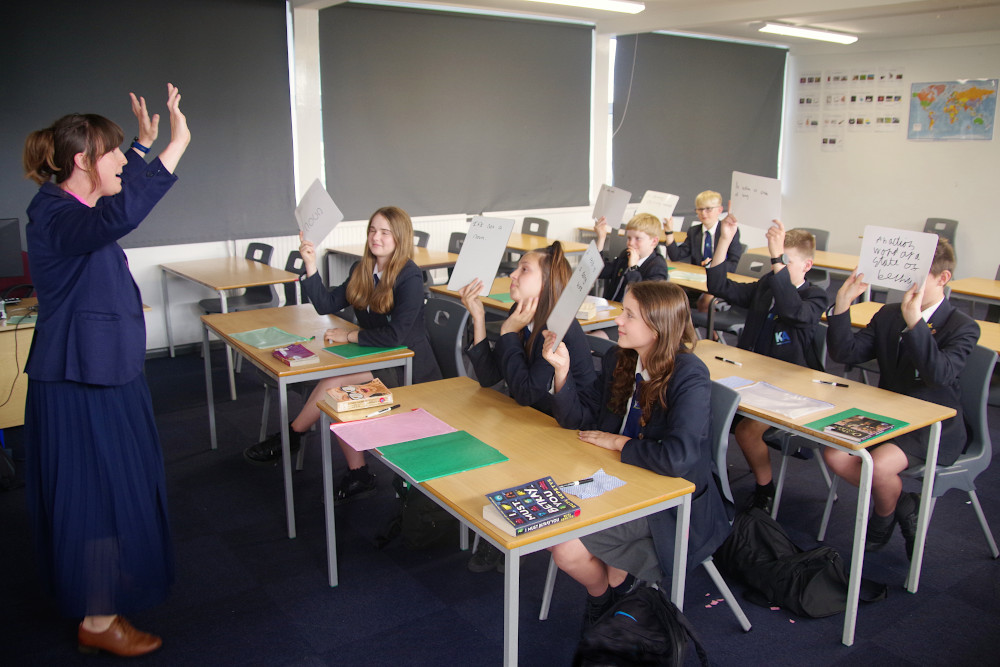Teaching and Learning
 Our intention for lessons at King Alfred’s is for them to be teacher-led, interactive and purposeful.
Our intention for lessons at King Alfred’s is for them to be teacher-led, interactive and purposeful.
We believe that our teachers are the subject experts, and for this reason we advocate that they generally avoid tasks that are ‘student-led’ as this often encourages students who have extensive prior knowledge to participate but disadvantages those whose general knowledge is not as developed yet, as well as allowing misconceptions to go unnoticed or uncorrected.
Our curriculum is designed to uphold our academy vision of ‘Opportunity for All’. By this we mean that the curriculum includes not only a broad range of subjects from Years 7 to 13, but also a rich variety of additional opportunities to learn and to develop through an enviable programme of extra-curricular activities, trips, visits, personal character development, and academic enrichment which are genuinely inclusive and open to all. At King Alfred’s, no student will ever be excluded from such activities owing to an inability to pay.
For parents of children with SEND needs, please access the SEND page which will provide more information on how we adapt our Teaching, Learning and Curriculum to meet student's needs.
Further information about the curriculum followed in each year group can be found in the Subjects by Faculty section of the website.
More on our Philosophy of Teaching
We believe that attention is the gatekeeper to learning and, in a time when the average daily time screen time is now over 6.5 hours per day, student attention often wanders. In order to combat this, we teach students to pay attention in order to maximise what they learn. After making sure they are paying attention, we get students to participate so that they can increase the time spent thinking and, in that way, build up a better understanding and retention of key knowledge, skills and concepts. We then check student understanding, often using mini whiteboards, ‘heads down questioning’, voting or cold calling before getting them to consolidate their learning.
In terms of making learning inclusive, in our lessons we use the term scaffolding to mean any temporary support given to aid learning that could be visual, verbal or written. Typically, these would be given once students have attempted to complete tasks independently, as it is always the case that these are removed as strategically as they are implemented so that students can feel confident in their own thinking and are not dependent on their teachers. Often, this scaffolding would also be used to adapt a part of lesson where it is clear that students need more support to progress in their learning.
We also strongly believe in the importance of routines as a way of building habits that establish a culture of attentive and respectful behaviour. These routines include how we enter a room; start a lesson; listen attentively; contribute to and end lessons. These are shared with students and are taught in lessons to enable all students and teachers to make the best possible use of lesson time. As these routines become habits, this frees up any sense of ‘cognitive overload’ that students might experience or anxiety associated with variation that differences in routine can cause.
More on our Curriculum Vision
Our curriculum is designed to support our core principles of Responsibility, Tolerance, Respect, Knowledge, Curiosity and Resilience and is intended to develop a wider cultural awareness through a consideration of texts, resources and ideas drawn from a range of different cultural perspectives which go far beyond the immediate cultural context of King Alfred’s Academy.
Our curriculum is planned around the acquisition of knowledge and skills and learning is sequenced and interleaved to support student progression. This enables everyone to fulfil their potential and improve their life chances, with key concepts being revisited to aid knowledge retention and subject mastery.
